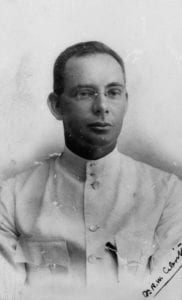 My new book, A Doctor Across Borders: Raphael Cilento and Public Health from Empire to the United Nations (Canberra: ANU Press, 2019), took a long time to emerge.
My new book, A Doctor Across Borders: Raphael Cilento and Public Health from Empire to the United Nations (Canberra: ANU Press, 2019), took a long time to emerge.
Years ago I submitted the manuscript to several university presses and independent academic publishers. They all turned it down, either because the subject matter didn’t align with their priorities or because they needed me to obtain a grant to cover publication costs. To be honest, I gave up on trying to publish it and focused on other things until a chance encounter with an encouraging Dr. Christine Winter at the University of Sydney reignited my efforts. I submitted a proposal to Australian National University Press and after many revisions it has now been published. I think it’s a good reminder of what can happen when we stay connected as you never know where encouragement might come from.
My book follows the career of Sir Raphael Cilento, an Australian public health official who worked in Queensland, New Guinea, and British Malaya between 1918 and 1950. He also engaged enthusiastically with international health programmes in the Pacific through the League of Nations Health Organization and even joined the United Nations Secretariat in the fields of refugee relief and international social welfare projects.
The book is not a traditional biography. It doesn’t survey Cilento’s whole life, nor is it comprehensive in the period it covers. When I started working on it, the project lay at the intersection of a number of emerging fields of historical research. On the one hand I was interested in the burgeoning field of transnational history, which aspired to explore the networked connections that grow and shift between national spaces.
On the other, my work reflected a renewed interest in using individual lives to capture transnational dynamics of history. Individual migrants, businessmen, officials, and others, thus become case studies for the movement of ideas and practices across borders.
In studying Cilento, therefore, my book uses an individual career to explore Australia’s colonial connections to the Pacific Islands; its engagement with internationalism and international organizations; and the way these Pacific relations informed ideas and practices concerning health, race, and nationhood in the first half of the twentieth century.
Article by NYU Sydney Pacific World History Instructor Alexander Cameron-Smith